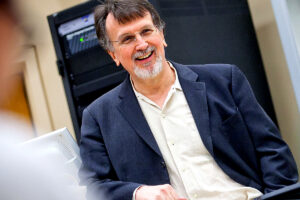Major text for Renaissance Florence
 Anthony Cummings, professor of music and coordinator of the Italian Studies Program, has received a contract from the University of Chicago Press for what may become the definitive book on the music of late-medieval and early-modern Florence, as well as an invitation to present at the Columbia University Seminar in the Renaissance.
Anthony Cummings, professor of music and coordinator of the Italian Studies Program, has received a contract from the University of Chicago Press for what may become the definitive book on the music of late-medieval and early-modern Florence, as well as an invitation to present at the Columbia University Seminar in the Renaissance.
The 450-page book, entitled Music in Golden-Age Florence, 1250-1750, will include eight color plates, 25 black-and-white illustrations, and 45 musical examples. In addition, La Morra, considered one of the leading European ensembles for late Medieval and Renaissance music and scheduled to perform in 2020 at the Williams Center for the Arts prior to the pandemic, will record a two- or three-CD set to accompany the text.
Florence, from the thirteenth to the seventeenth century, was a cradle for the visual arts, literature, and science. Music and music-making were just as central to city life throughout these centuries, gifting the world, among other musical inventions, the Renaissance madrigal, opera, and the piano.
Until Cummings, no author has attempted a comprehensive history of Florence’s contributions to music and how music was cultivated and supported in the city, from civic and religious institutions to private patronage and the academies.
As a result, the music of Renaissance Florence has remained largely unknown, as scholars in other fields have lacked an important resource allowing them to incorporate music in their writings, while general readers and lovers of the city have lacked an understanding of how music flourished side by side with the other arts to define what is known as the city’s golden age.
As a scholar of both music and Italian literature, Cummings has dedicated his life and career to the study of Florence and has developed an unparalleled knowledge of the city’s history and its cultural life through the centuries.
One of the key benefits of the book’s long historical arc is an understanding of how some of the most distinctively Florentine musical genres were cultivated over centuries as well as heard and performed in cathedrals, convents, and city palaces, and at religious services, lay confraternities, festive banqueting, public ceremonies, and private gatherings. What will emerge from the narrative is a resonant “soundscape” of the city.
In addition to the book, Cummings has been invited to present a paper at the 2021 Columbia University Seminar in the Renaissance, established by Professor Paul Oskar Kristeller, one of the most distinguished historians of the Italian Renaissance of the twentieth century. Past presenters have included esteemed scholars of the Italian Renaissance including Millard Meiss, Charles Trinkaus, Josephine Waters Bennett, Theodor Mommsen, Felix Gilbert, and Hans Baron.